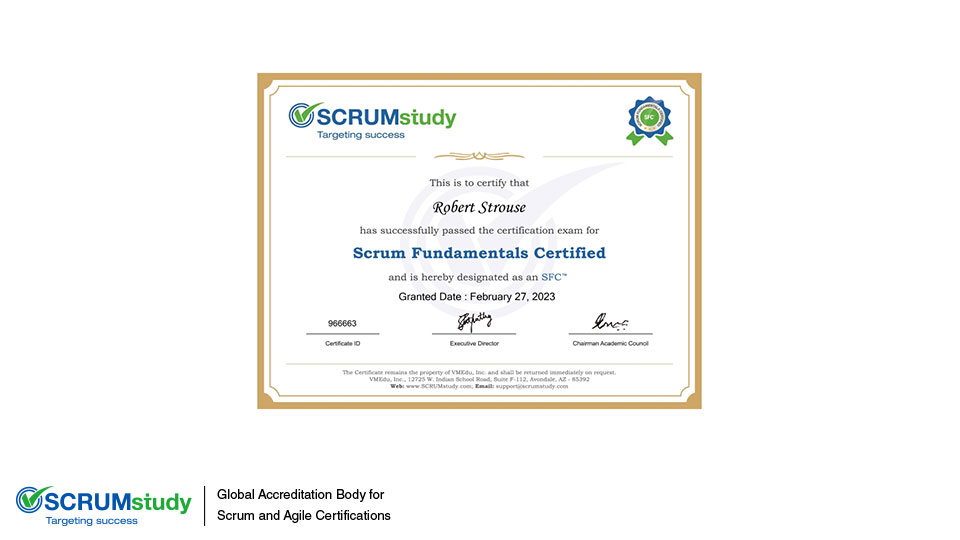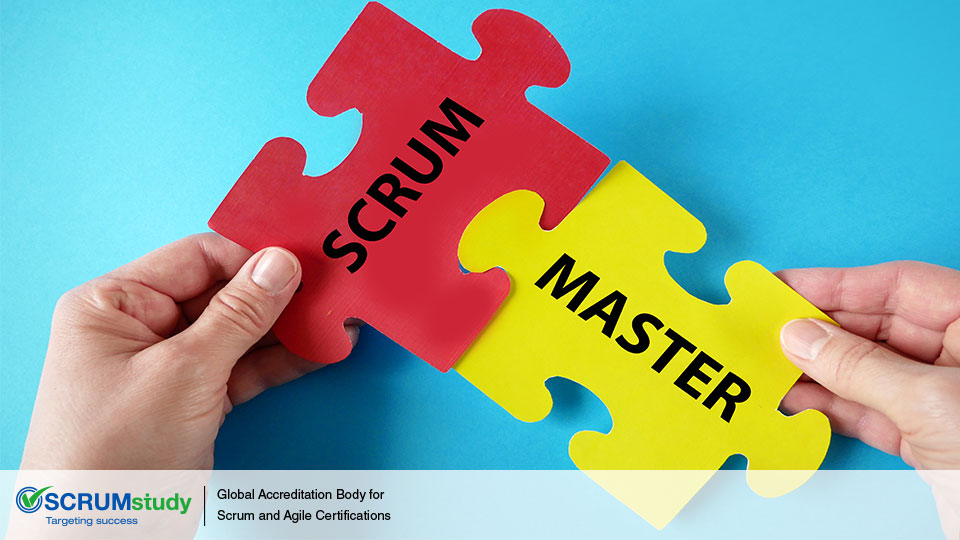What are the typical steps in the Professional Scrum Master Certification path, and how do these steps build on each other to develop a Scrum Master's skills and knowledge?
Posted by SCRUMstudy® on July 31, 2024
Categories: Agile Product Backlog SBOK® Guide Scrum Sprint Backlog
The Scrum Master Certification Path from SCRUMstudy provides a structured and comprehensive journey for individuals seeking to master Scrum practices and principles. It begins with the free Scrum Fundamental Certification (SFC) followed by Scrum Developer Certified (SDC) course, which covers the basics of Scrum. This is followed by the Scrum Master Certified (SMC) certification, which delves deeper into the roles and responsibilities of a Scrum Master, emphasizing facilitation, collaboration, and leadership skills. For those looking to further enhance their expertise, the SCRUMstudy offers advanced certifications like the Advanced Scrum Master Certified (A-SMC) and the Expert Scrum Master Certified (E-SMC). Each level builds on the previous one, ensuring a thorough understanding and practical ability to implement Scrum in various project environments.
This program typically covers the principles and practices of Scrum, an agile framework for managing complex projects. Participants learn about Scrum roles, artifacts, events, and the core values and principles of agile methodologies. The certification process often includes a combination of coursework, hands-on exercises, and a final assessment to validate one's understanding and proficiency in applying Scrum practices. Scrum Master Certified (SMC) is recognized for their ability to enhance team collaboration, productivity, and deliver high-quality projects in iterative cycles.
Scrum Master certification holds significant importance in the agile landscape as it validates individuals' proficiency in Scrum methodology. This certification demonstrates a thorough understanding of Scrum principles, roles, events, and artifacts, essential for effective project management. Employers often seek certified Scrum Masters to lead agile teams, drive organizational change, and ensure successful project delivery. Certification not only enhances job prospects but also signifies a commitment to continuous learning and professional development. Moreover, certified Scrum Masters contribute to building high-performing teams, fostering collaboration, and maximizing business value, making their role indispensable in today's dynamic and competitive business environment.
We will attempt to do a quick overview of some of the Scrum certifications that are currently being offered.
Then, we will talk about figuring out the right trainer. It is beneficial to find a Scrum trainer with the background as yours however it is not an absolute requirement. The framework and the style of the Scrum training can vary from trainer to trainer, so you should try to figure out which one suits your learning style.
The biggest positive of a formal Scrum training is that you learn everything in a controlled environment. You meet people who are also there to learn about Scrum and in case you have common background, it helps to understand the process and difficulties of implementation from outsider’s point of view. A formal training also helps you understand about the mistake which you may make due to the traditional project management concepts rooted in you.
The main purpose of any certification is to impart a common baseline of the knowledge. These Scrum certifications, compared to any other project management certifications have a very easy test. You should remember that getting a Scrum certificate is way easier than the implementing actual Scrum framework.
Scrum/Agile methodology in general gives you a lot of freedom in how you implement it. However you should avoid changing the essence of the whole process. These project managers are commonly referred as Scrumbut. The common suggestion is that you start to implement Scrum as it is until you understand it properly and then decide for yourself what you might want to change. After a while you may find that you don’t need to change anything at all.
You need to understand that nothing is more valuable than experience. Scrum or Agile Certification may only add some credibility and marketability to the individual.
Professional Scrum Master Certification Path
Posted by SCRUMstudy® on July 05, 2024
Categories: Agile Product Backlog SBOK® Guide Scrum Sprint Backlog
The Scrum Master Certification Path from SCRUMstudy provides a structured and comprehensive journey for individuals seeking to master Scrum practices and principles. It begins with the free Scrum Fundamental Certification (SFC) followed by Scrum Developer Certified (SDC) course, which covers the basics of Scrum. This is followed by the Scrum Master Certified (SMC) certification, which delves deeper into the roles and responsibilities of a Scrum Master, emphasizing facilitation, collaboration, and leadership skills. For those looking to further enhance their expertise, the SCRUMstudy offers advanced certifications like the Advanced Scrum Master Certified (A-SMC) and the Expert Scrum Master Certified (E-SMC). Each level builds on the previous one, ensuring a thorough understanding and practical ability to implement Scrum in various project environments.
This program typically covers the principles and practices of Scrum, an agile framework for managing complex projects. Participants learn about Scrum roles, artifacts, events, and the core values and principles of agile methodologies. The certification process often includes a combination of coursework, hands-on exercises, and a final assessment to validate one's understanding and proficiency in applying Scrum practices. Scrum Master Certified (SMC) is recognized for their ability to enhance team collaboration, productivity, and deliver high-quality projects in iterative cycles.
Scrum Master certification holds significant importance in the agile landscape as it validates individuals' proficiency in Scrum methodology. This certification demonstrates a thorough understanding of Scrum principles, roles, events, and artifacts, essential for effective project management. Employers often seek certified Scrum Masters to lead agile teams, drive organizational change, and ensure successful project delivery. Certification not only enhances job prospects but also signifies a commitment to continuous learning and professional development. Moreover, certified Scrum Masters contribute to building high-performing teams, fostering collaboration, and maximizing business value, making their role indispensable in today's dynamic and competitive business environment.
We will attempt to do a quick overview of some of the Scrum certifications that are currently being offered.
Then, we will talk about figuring out the right trainer. It is beneficial to find a Scrum trainer with the background as yours however it is not an absolute requirement. The framework and the style of the Scrum training can vary from trainer to trainer, so you should try to figure out which one suits your learning style.
The biggest positive of a formal Scrum training is that you learn everything in a controlled environment. You meet people who are also there to learn about Scrum and in case you have common background, it helps to understand the process and difficulties of implementation from outsider’s point of view. A formal training also helps you understand about the mistake which you may make due to the traditional project management concepts rooted in you.
The main purpose of any certification is to impart a common baseline of the knowledge. These Scrum certifications, compared to any other project management certifications have a very easy test. You should remember that getting a Scrum certificate is way easier than the implementing actual Scrum framework.
Scrum/Agile methodology in general gives you a lot of freedom in how you implement it. However you should avoid changing the essence of the whole process. These project managers are commonly referred as Scrumbut. The common suggestion is that you start to implement Scrum as it is until you understand it properly and then decide for yourself what you might want to change. After a while you may find that you don’t need to change anything at all.
You need to understand that nothing is more valuable than experience. Scrum or Agile Certification may only add some credibility and marketability to the individual.
Scrum Master Certification Pathways
Posted by SCRUMstudy® on June 12, 2024
Categories: Agile Product Owner Scrum Scrum Guide Scrum Master Scrum Team
In the realm of agile project management, the Scrum Master Certification Pathways provide a structured approach for professionals aiming to master the intricacies of Scrum methodology. These pathways cater to diverse backgrounds, whether one is new to Scrum or seeking to advance their current expertise. Beginning with the Scrum Fundamentals Certified (SFC™) credential, aspirants grasp the foundational principles and roles within Scrum teams. Moving forward, the Scrum Master Certified (SMC™) certification equips individuals with deeper knowledge in managing Scrum processes effectively, while the Expert Scrum Master Certified (ESMC™) level enhances their ability to lead complex projects and foster organizational agility. Each certification not only validates competence but also signifies a commitment to continuous improvement in agile practices, ensuring Scrum Masters are equipped to navigate challenges and drive success in dynamic project environments.
Scrum Master Certification can significantly impact an individual's career and the performance of their team. This certification demonstrates a deep understanding of the Scrum framework, principles, and practices, which are essential for effectively facilitating agile projects. Certified Scrum Masters (SMC) are equipped to help teams improve collaboration, manage workflow, and increase productivity. Organizations benefit from the presence of certified Scrum Masters through enhanced project success rates, better adaptability to changing project requirements, and improved team morale. Additionally, the certification can open up advanced career opportunities, lead to higher salaries, and establish professionals as credible and knowledgeable leaders in agile methodologies.
Obtaining a Scrum Master Certification can significantly boost team productivity by equipping leaders with the skills needed to facilitate agile processes effectively. Certified Scrum Masters are trained to implement best practices, foster clear communication, and remove obstacles that hinder progress. This certification ensures that Scrum Masters are proficient in coordinating Scrum activities, leading to more efficient sprint planning, execution, and delivery. As a result, teams can work more cohesively, respond to changes promptly, and achieve higher output and quality in their projects.
Scrum Master Certification Path
Posted by SCRUMstudy® on June 10, 2024
Categories: Agile Product Backlog SBOK® Guide Scrum Sprint Backlog
The Scrum Master Certification Path from SCRUMstudy provides a structured and comprehensive journey for individuals seeking to master Scrum practices and principles. It begins with the free Scrum Fundamental Certification (SFC) followed by Scrum Developer Certified (SDC) course, which covers the basics of Scrum. This is followed by the Scrum Master Certified (SMC) certification, which delves deeper into the roles and responsibilities of a Scrum Master, emphasizing facilitation, collaboration, and leadership skills. For those looking to further enhance their expertise, the SCRUMstudy offers advanced certifications like the Advanced Scrum Master Certified (A-SMC) and the Expert Scrum Master Certified (E-SMC). Each level builds on the previous one, ensuring a thorough understanding and practical ability to implement Scrum in various project environments.
This program typically covers the principles and practices of Scrum, an agile framework for managing complex projects. Participants learn about Scrum roles, artifacts, events, and the core values and principles of agile methodologies. The certification process often includes a combination of coursework, hands-on exercises, and a final assessment to validate one's understanding and proficiency in applying Scrum practices. Scrum Master Certified (SMC) is recognized for their ability to enhance team collaboration, productivity, and deliver high-quality projects in iterative cycles.
Scrum Master certification holds significant importance in the agile landscape as it validates individuals' proficiency in Scrum methodology. This certification demonstrates a thorough understanding of Scrum principles, roles, events, and artifacts, essential for effective project management. Employers often seek certified Scrum Masters to lead agile teams, drive organizational change, and ensure successful project delivery. Certification not only enhances job prospects but also signifies a commitment to continuous learning and professional development. Moreover, certified Scrum Masters contribute to building high-performing teams, fostering collaboration, and maximizing business value, making their role indispensable in today's dynamic and competitive business environment.
We will attempt to do a quick overview of some of the Scrum certifications that are currently being offered.
Then, we will talk about figuring out the right trainer. It is beneficial to find a Scrum trainer with the background as yours however it is not an absolute requirement. The framework and the style of the Scrum training can vary from trainer to trainer, so you should try to figure out which one suits your learning style.
The biggest positive of a formal Scrum training is that you learn everything in a controlled environment. You meet people who are also there to learn about Scrum and in case you have common background, it helps to understand the process and difficulties of implementation from outsider’s point of view. A formal training also helps you understand about the mistake which you may make due to the traditional project management concepts rooted in you.
The main purpose of any certification is to impart a common baseline of the knowledge. These Scrum certifications, compared to any other project management certifications have a very easy test. You should remember that getting a Scrum certificate is way easier than the implementing actual Scrum framework.
Scrum/Agile methodology in general gives you a lot of freedom in how you implement it. However you should avoid changing the essence of the whole process. These project managers are commonly referred as Scrumbut. The common suggestion is that you start to implement Scrum as it is until you understand it properly and then decide for yourself what you might want to change. After a while you may find that you don’t need to change anything at all.
You need to understand that nothing is more valuable than experience. Scrum or Agile Certification may only add some credibility and marketability to the individual.
Scaled Scrum Master Certification Path
Posted by SCRUMstudy® on December 19, 2022
Categories: Agile Product Owner Scrum Scrum Master Scrum Principles Scrum Team
Scaled Scrum Master Certification Path equips seasoned Scrum Masters with advanced skills in managing large-scale agile projects. This certification path focuses on mastering frameworks like Nexus and LeSS, essential for orchestrating multiple Scrum teams towards unified project goals. Participants gain expertise in resolving inter-team dependencies, optimizing product delivery flow, and ensuring alignment across complex organizational structures. The Scaled Scrum Master certification validates proficiency in scaling Scrum principles effectively, fostering collaboration, and enhancing agility at enterprise levels. Ideal for agile practitioners aspiring to lead transformational initiatives, this path ensures readiness to navigate challenges in diverse, scaled agile environments.
Introduction: Scaling Agile practices across large enterprises demands specialized skills and knowledge. SCRUMstudy's SSMC™ certification empowers Scrum Masters with the expertise needed to navigate the complexities of scaled Agile environments effectively. This certification is designed to equip professionals with advanced techniques and strategies for orchestrating multiple Scrum Teams to collaborate seamlessly towards shared goals.
Key Benefits: Achieving SSMC™ certification signifies mastery in scaling Agile frameworks such as Scrum-of-Scrums, Nexus, or SAFe®. Professionals gain proficiency in fostering collaboration, resolving dependencies, and optimizing resources across distributed teams. The certification also validates the ability to implement Agile best practices tailored to organizational needs, ensuring sustainable growth and improved project outcomes.
Conclusion: For ambitious professionals and organizations committed to Agile excellence, SCRUMstudy's Scaled Scrum Master Certified (SSMC™) certification serves as a definitive pathway to enhancing leadership capabilities and driving business agility at scale. Embrace the future of project management with SSMC™ and lead your teams towards unparalleled success in today's dynamic business environment.



